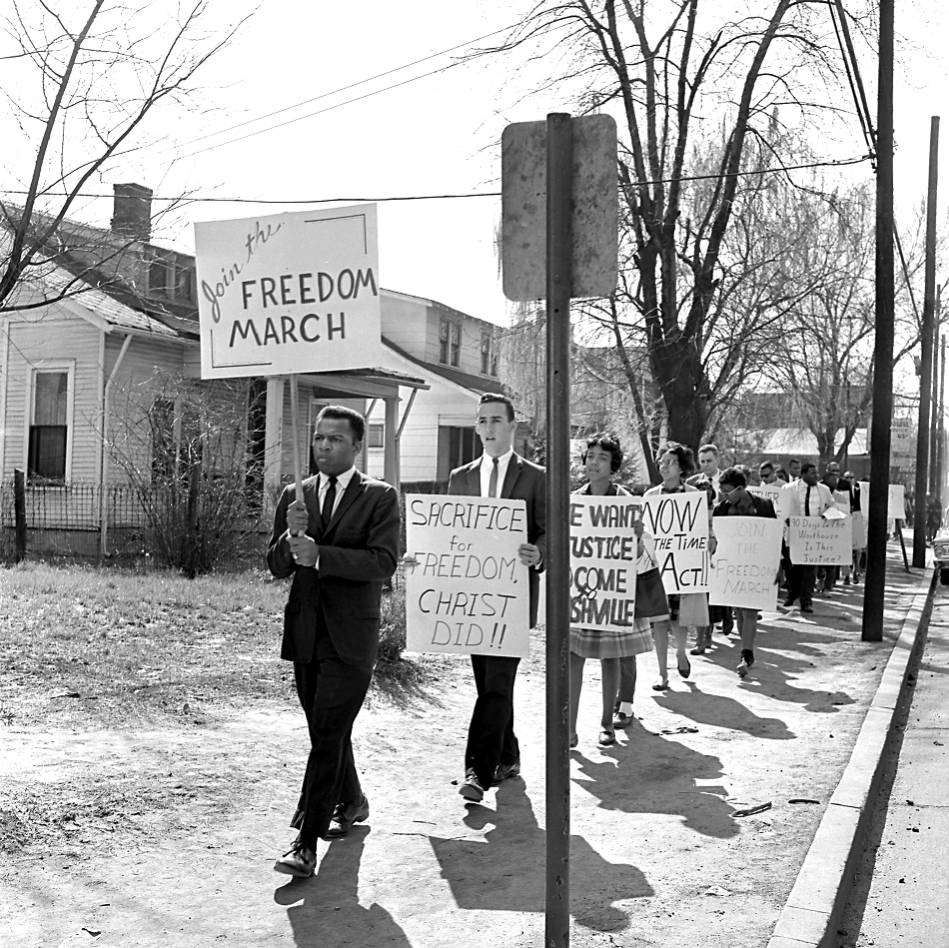The Nashville Operation Open City Movement was a civil rights campaign in Nashville, Tennessee, between 1961 and 1964. This three-year campaign would become one of the longest ongoing efforts to desegregate public accommodations in any city in the nation in the 1960s. The main goal of the campaign was to end racial segregation in all public accommodations that remained segregated in the city. During the summer of 1961, the Nashville Christian Leadership Council (NCLC) led other Nashville human relations groups in a project called Operation Open City.
On November 18, 1961, the NCLC sponsored sit-in demonstrations in downtown restaurants in Nashville. Students from Tennessee A&I University (Now Tennessee State University) and Fisk University attempted to gain service at the coffee shop at the Andrew Jackson Hotel, the Tick Toc Restaurant, the Krystal, Candyland, and the Wilson-Quick Pharmacy. The students were refused service at all establishments.
On January 6, 1962, a small group of Black and White students, including John Lewis and Susan Wilbur, led sit-in demonstrations at the Wilson-Quick Pharmacy. A Wilson-Quick Pharmacy employee threw a Black student out of the store during the sit-in. On January 13, 1962, the sit-in demonstrations resumed at Wilson-Quick Pharmacy, and both Black and white students from local colleges participated for the first time. John Lewis broke up a fight between protestors and Wilson-Quick employees during this demonstration. One Black female student was injured and taken to a local hospital.
A month later, on February 1, 1962, protest demonstrations occurred at the Andrew Jackson Hotel when 24 Black male students, including Lewis, sat down in the hotel’s lobby after a Black student demonstrator attempted to register at the hotel. Several White men attending a party in the hotel shouted insults at the students and then attacked them with ice cubes and beer bottles. Despite the attack, the students remained the rest of the afternoon until four Nashville policemen arrived and remained with the students until they left the hotel. Other students protested at the Hermitage Hotel, where they were blocked from entering the building. In November and December 1962, protests resumed at several Nashville businesses, including the Wilson-Quick Pharmacy, B&W Cafeteria, Herschel’s Tic Toc, and Cross Keys restaurants.
On February 24, 1963, around 60 demonstrators marched from First Colored Baptist Church to the downtown YMCA to protest their segregated policies. Days later, on March 4, 1963, sixteen demonstrators, including William David Jones, a 61-year-old minister, staged the largest challenge to Nashville segregation since 1960. They staged a sit-in at the Cross Keys Restaurant, where all sixteen demonstrators were arrested that day.
On March 23, 1963, on what will be known as “the Freedom March,” 85 demonstrators marched through downtown Nashville, calling for access to all downtown area public accommodations. One week later, on March 30, 1963, a second “Freedom March” occurred in downtown Nashville. Protests would continue in April and May 1963 and throughout the summer of 1963. They resumed in the Spring of 1964 until the U.S. Congress passed the Civil Rights Act on July 2, 1964, which abolished racial segregation in all of Nashville’s Public accommodations and similar facilities across the United States.
Do you find this information helpful? A small donation would help us keep this available to all. Forego a bottle of soda and donate its cost to us for the information you just learned, and feel good about helping to make it available to everyone.
BlackPast.org is a 501(c)(3) non-profit and our EIN is 26-1625373. Your donation is fully tax-deductible.
“Nashville Open City Movement,” Lost Nashville: First Baptist Church had major role in the civil rights movement,https://www.tennessean.com/story/news/2020/06/05/lost-nashville-first-baptist-churchs-major-role-civil-rights-movement/3054935001/; “Nashville Open City Movement,” Toward The Beloved Community: The Story of the Nashville Christian Leadership, https://www.crmvet.org/docs/61_nclc.pdf ; Kelly Miller Smith Papers, “Nashville Christian Leadership Council” Box 1.
Your support is crucial to our mission.
Donate today to help us advance Black history education and foster a more inclusive understanding of our shared cultural heritage.

